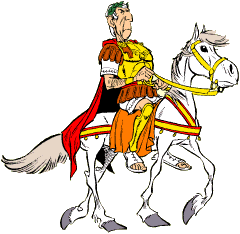Why some books come to us through the ages, while others disappear is a testament to their greatness and their importance. Once such book was written by one of the most influential minds of Western civilization: Julius Caesar.
Historians such as myself love to debate whether he brought about a great age (the Empire) or if he destroyed a system that was already failing (the Republic). For better or worse, he lived in a time where the Roman Empire saw massive expansion and the additions of provinces that would make it the most powerful, most populous, biggest and largest the world had ever seen.
 Caesar was one of the figures that was central to this expansion. By hook and crook (let's be honest, he did not only do some nice things), he added Gaul to the Empire. As a way to self-promote, he kept a journal embellishing his deeds and turn his victories into triumphs.
Caesar was one of the figures that was central to this expansion. By hook and crook (let's be honest, he did not only do some nice things), he added Gaul to the Empire. As a way to self-promote, he kept a journal embellishing his deeds and turn his victories into triumphs.
From a historian's point of view, it is important to keep Caesar's words in their context: he sought election as consul, he was in a close race with other equally valued generals (Marcus Crassus and Pompey the Great), and he wanted to let the people know of the harshness of the conditions.
With that in mind the Gallic Wars is a veritable time machine: a geographic study, a history book, a manual of martial maneuvers, and direct insight into the Gaul of two millennium ago. Names, places and people now long gone have reached us through the ages.
At first, in spite of my great love of history, I must sadly admit that the idea to read this book never occurred to me until I was past twenty-five years of age. But when I began to read it, I could not put it down. Even translated, the narrative was interesting, quick and informative. I expected something much more literal and procedural - like a professor's lecture.
But it reads like a good war novel. I can say that Caesar is even more interesting that writers who have written something similar, I'll name Glenn Cook and his Black Company as an example.
For years now, I have been putting off reading the sequel - the Social Wars - where Caesar tells of his falling out with Crassus and Pompey on the path to him being named dictator. It's on my list, I'll get to it eventually. If the first one was interesting, the second one will also be a blast.
JP

No comments:
Post a Comment